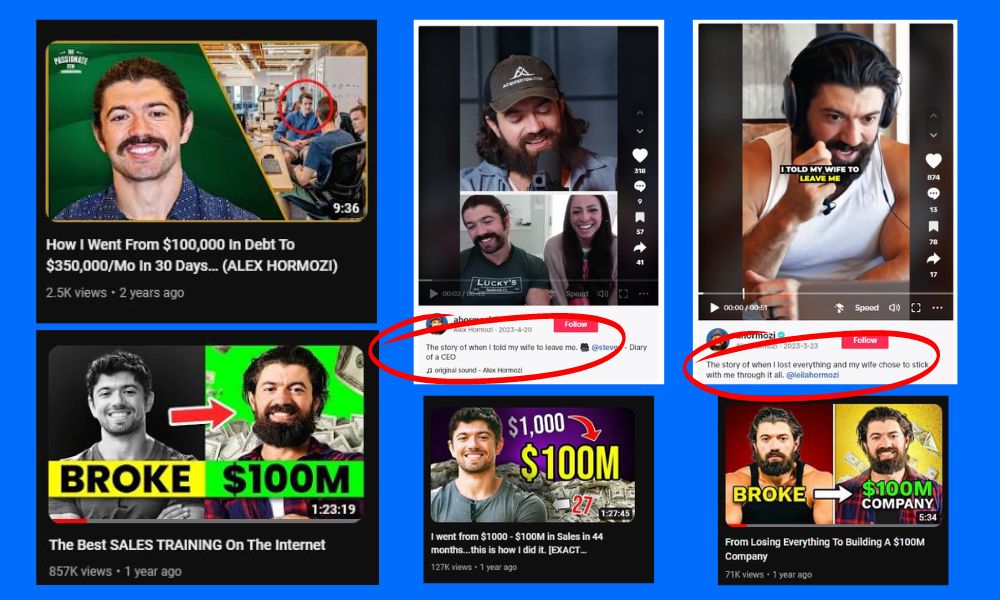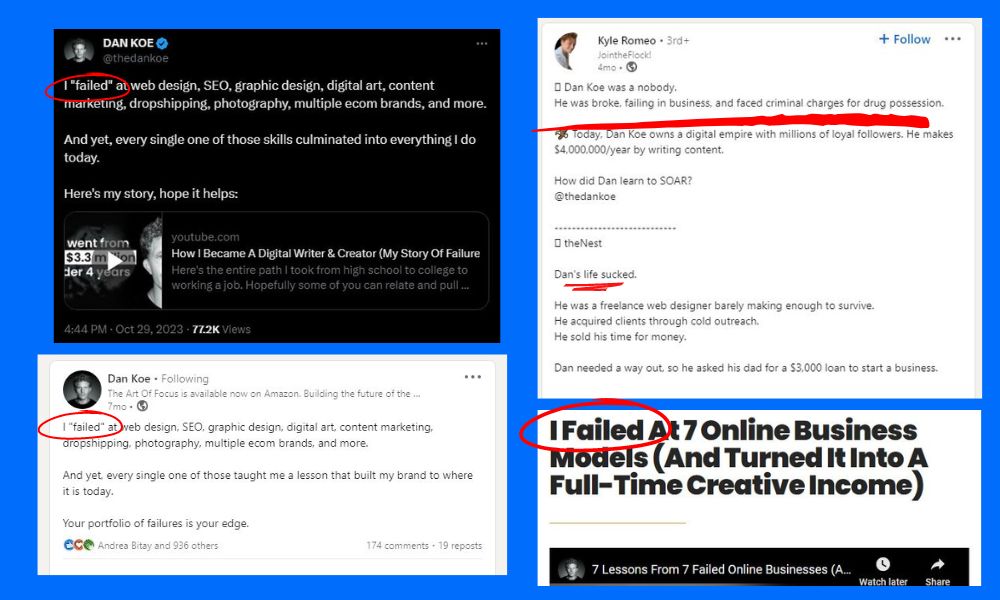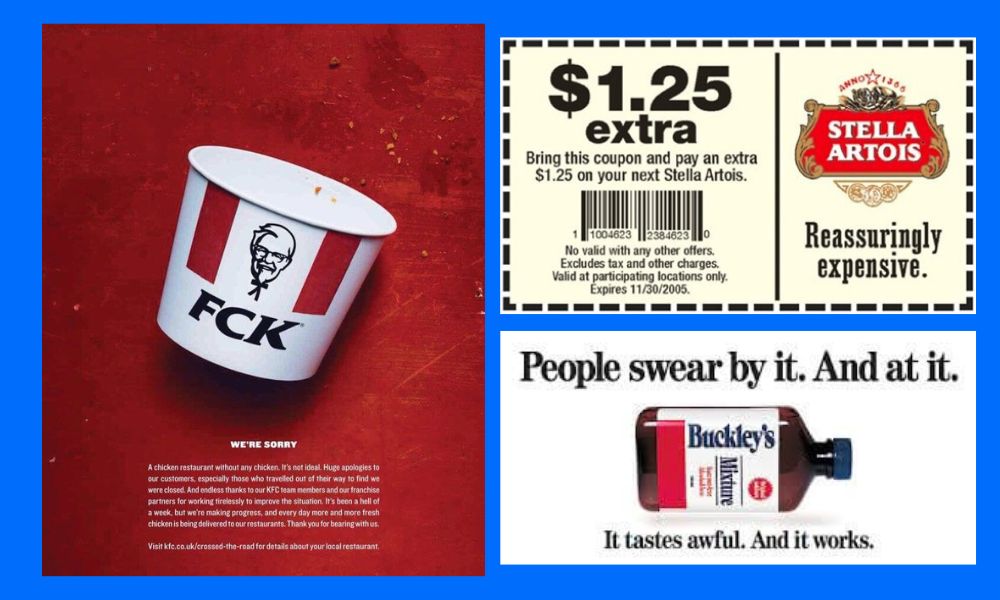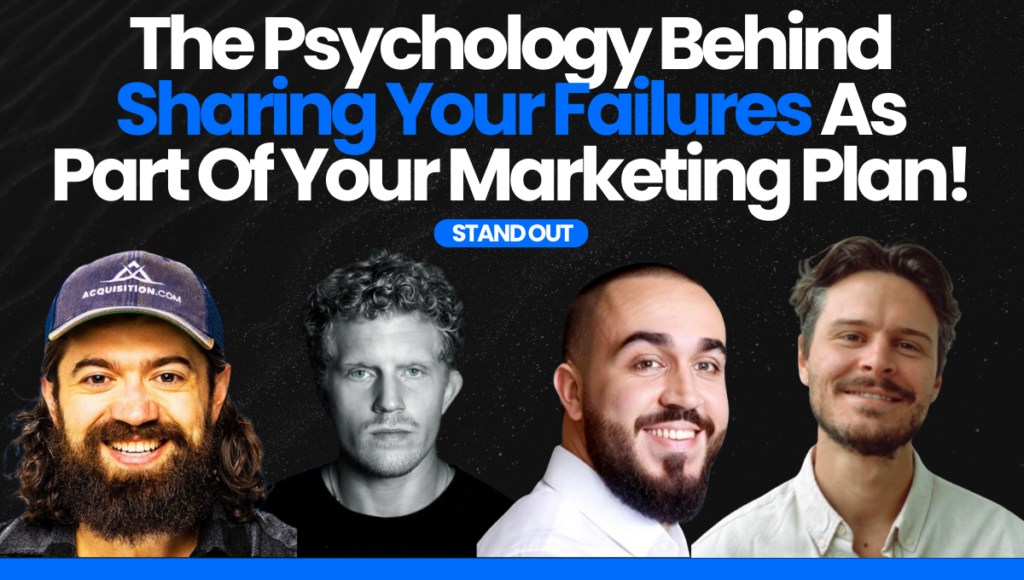In this creator case study we're doing things a little differently than normal.
On Friday I shared a massive case study on 13+ psychological nudges Amazon uses to get us to buy more, but I felt there was something missing...
What I really want to do is put the creators-first. Which would have meant being able to give more visual references to how creators use each of those 13+ nudges and tactics in their own marketing, so you can take it and run with it.
Unfortunately, it would have turned out to be a short novella, considering it was already way longer than I originally anticipated.
That said, today's case study is instead going to feature ONE marketing tactic (in this case a psychological bias), with a handful of creators (as opposed to ONE CREATOR or brand with many many different nudges).
If you like this style, please let me know so I can continue using it!
Without further ado, let's discuss The Pratfall Effect.
 The Pratfall Effect
The Pratfall Effect
The pratfall effect is a psychological phenomenon that suggests that a person's likability increases when they make a mistake or appear more human by displaying a minor flaw.
And this can apply to both humans and brands.
The concept was first introduced by social psychologist Elliot Aronson in a study he conducted in 1966. Aronson found that, in certain situations, making a small mistake can actually enhance the likability of an individual.
It's worth noting that it's generally effecting when the person (or brand) committing the pratfall (minor blunder) is initially seen as competent (or better yet, an authority).
The "pratfall" then helps to make them more relatable or human.
It can also help build authenticity and transparency, leading to more trust, which is a massive advantage in today's marketing.
For this one we'll be breaking down how top creators use The Pratfall Effect in their marketing.

 Alex Hormozi
Alex Hormozi
If you follow Alex Hormozi you've probably heard his rags to riches story.
The story of how he lost everything and then came back and made over $100M.
He even goes as far as saying at one point he was so broke [when he lost everything] he told Leila (his wife) to leave him.
Here's the story I'll highlight to show the effect a bit more:
"I'm at her parents house, sleeping in their room, because we couldn't afford anything - and at this moment I was like: 'Okay, this could go horribly wrong...and given my track record up until this point, which has been now all failure, I think I'm a sinking ship right now, like nothing else has worked...I respect you if you want to dip out.' And that was when she said she would stay with me."
This is just a small piece of the story, but it should do a good job showing the effect of The Pratfall Effect.
Even Alex Hormozi, worth $100M+, was once a failure.
He's not a robot. He's human.
He's extremely transparent about:



The Pratfall Effect has actually become a big piece of his branding.
It is embedded into the brand, because it's his story.
Think of someone like Dwayne Johnson and his "I only had 7 dollars in my pocket" story, which has now become a piece of his brand so much so that he started "7 Bucks Production".

 Dan Koe
Dan Koe
The Pratfall Effect is still extremely effective without making it THAT massive of a piece of your brand, though.
Dan Koe has millions of followers across his social platforms:
- 1.6M Instagram
- 550K YouTube
- 416K Twitter
- 116K LinkedIn
And people resonate with his transparency, and the journey.
It comes back to storytelling - but being open with your storytelling.
The specific piece I want to highlight here actually isn't even his own post(s), it comes from a random audience member telling Dan's story.
But not just his success...his failures, and how he overcame them.
The underdog story that led to the success.
Here are some quotes from the post:
Dan Koe was a nobody.
He was broke, failing in business, and faced criminal charges for drug possession.
Dan's life sucked.
He was a freelance web designer barely making enough to survive.
He acquired clients through cold outreach.
He sold his time for money.
Dan invested his dad's money into a blue light glasses startup.
He lost ALL of it.
His paid advertisements failed to convert, and his company went bankrupt.
Each of these sections were the HOOKS to the next piece of information.
The failures. The transparency.
Those are the things that resonated.

 Jasmin Alic and Matt Barker
Jasmin Alic and Matt Barker
In this next section I want to highlight two incredible LinkedIn creators: Jasmin Alic and Matt Barker.
- Jasmin shares his story of how he quit LinkedIn after 5 days (and now he has 171K+ followers).
- Matt shares the story of how he sent out an offer to his email list and got ZERO orders.
They each have over a hundred thousand followers, and make well over $10,000+ per month doing what they do.
They could easily just share their wins.
But instead they are sharing their past failures.
Not only are they motivating others along similar paths (speaking directly to them and making them feel seen), but they're also becoming more human themselves.
I'm specifically highlighting THE HOOK of each of these posts, because I want to show some insights pertaining to The Pratfall Effect and how you can (and should) use it:
- Transparency WINS.
- LEAD with it in your posts.
- It is EASY to incorporate with storytelling.
At first it's easy to think that sharing our mishaps will retract from our credibility or take away from the authority we're looking to build...
But in reality it's the exact opposite.
Remember: your competition is out there bragging, lying and exaggerating - thinking it's going to win them followers.
Be different. Be open. Be transparent.

 Corporate Pratfall: KFC, Buckley's & Stella Artois
Corporate Pratfall: KFC, Buckley's & Stella Artois
While I wanted to mainly highlight the way creators are using The Pratfall Effect in their content and branding, I think it's fun to see how some corporate brands have used it as well.
We'll start with the easy ones to read/understand here:
- Buckley's admits their product tastes awful. They accepts and are transparent about it. But guess what...it works!
- Stella Artois had an ad for a coupon that made you pay MORE! They build on it being "Reassuringly expensive", highlighting and accepting their pratfall of being expensive, but essentially telling us Expensive = Better.
Which brings us to KFC's Pratfall, which is a really fun one.
To give you some brief background information before sharing the full ad copy:
In 2018, KFC experienced a supply chain issue in the UK, which left many of its locations without chicken.
Instead of pretending like it wasn't happening and ignoring it until it went away, the KFC team put together an ad campaign that switched the KFC letters to FCK.
They then proceeded to write:
A chicken restaurant without any chicken. It's not ideal. Huge apologies to our customers, especially those who travelled out of their way to find we were closed. And endless thanks to our KFC team members and our franchise partners for working tirelessly to improve the situation. It's been a hell of a week, but we're making progress, and every day more and more fresh chicken is being delivered to our restaurants. Thank you for bearing with us.
The ad was an immediate success.
It hit over 1000 articles and had 8.6 million impressions on Twitter within THREE DAYS!
The power of both a clever image mixed with The Pratfall effect and transparency.

 How To Incorporate The Pratfall Effect In YOUR Marketing
How To Incorporate The Pratfall Effect In YOUR Marketing
The digital marketing world is filled to the brim with people bragging about their achievements...and even worse: making up stories to make themselves seem better than everyone else.
So while your competitors are bragging, you can be building transparency, trust and a tribe around your message.
With Superhero Jacked I admit my humanity. I tell the story of how I gained a lot of weight after having Covid and a leg injury. It was just hard to get back in the swing of things after that, and I let myself go more than I should have.
That story sells more without a hard sales pitch than any of the other emails I send.
It takes longer to pour a Guinness than other beers. They use their disadvantage to spin it as a good thing. Takes longer = must taste better.
However you want to look at it: admitting your flaws, showing your humanity, and telling your story will get you further than constant bragging and pretending you're immune to all hiccups and failures.
Here are a few things to remember:
- Your competition is out there bragging, exaggerating and lying.
- We automatically assume faults mean people will like us or trust us less....
- Studies prove that it's actually the opposite: people like us MORE because of them.
- Tell your story. Don't skip the hiccups, the pratfalls. Share your faults.
For the teaser of this newsletter [on social before it was sent out] I told the story about how my one goal in life when I was younger (and even 3 years into college) was to become a bestselling fiction author. Then years later, when Superhero Jacked was down to only needing about 10 or so hours a week of work, I finally had the chance to live my dream. And I failed. I hated it. My childhood dream crushed.
Not everyone is perfect. We don't all succeed at everything we do.
Share your hiccups and faults.



